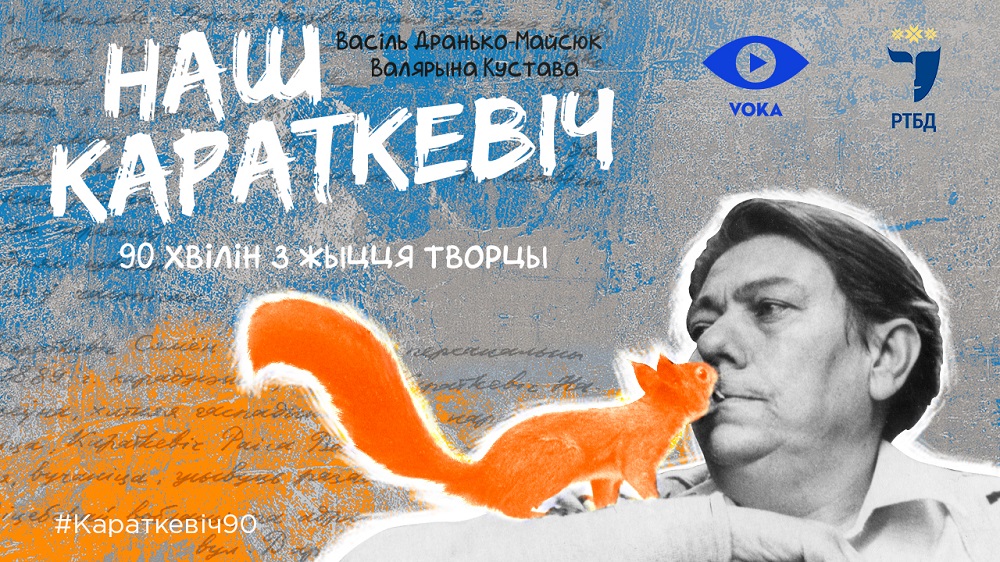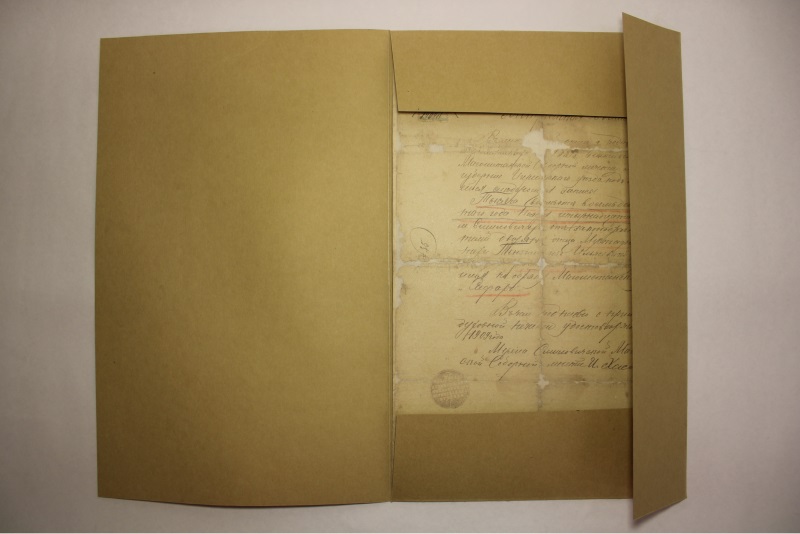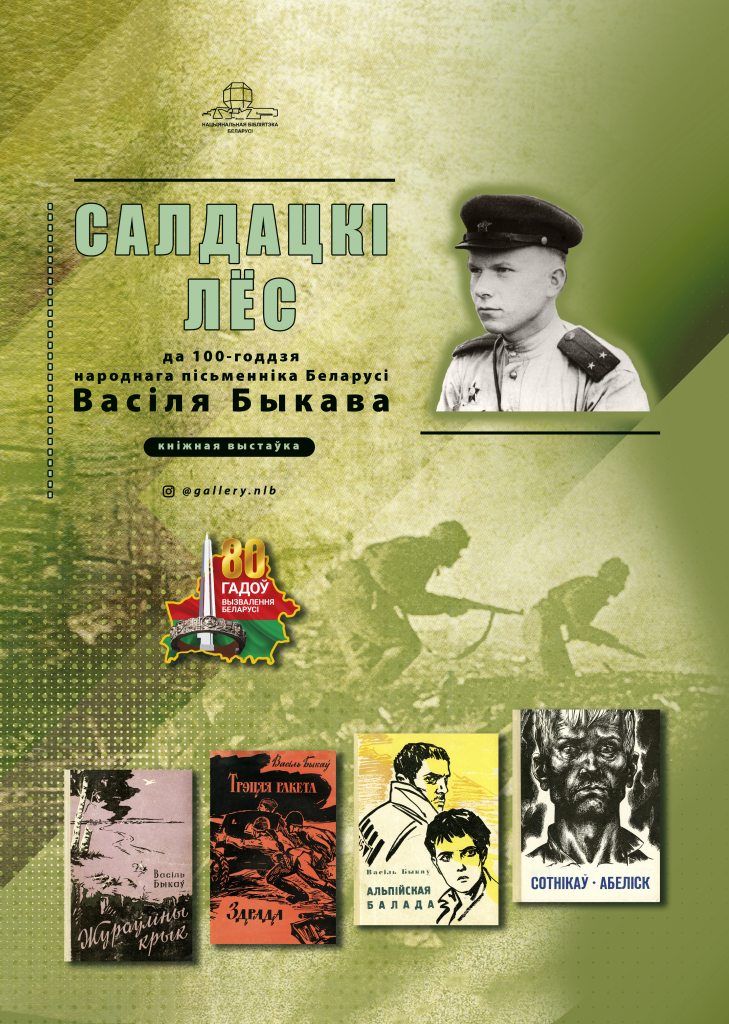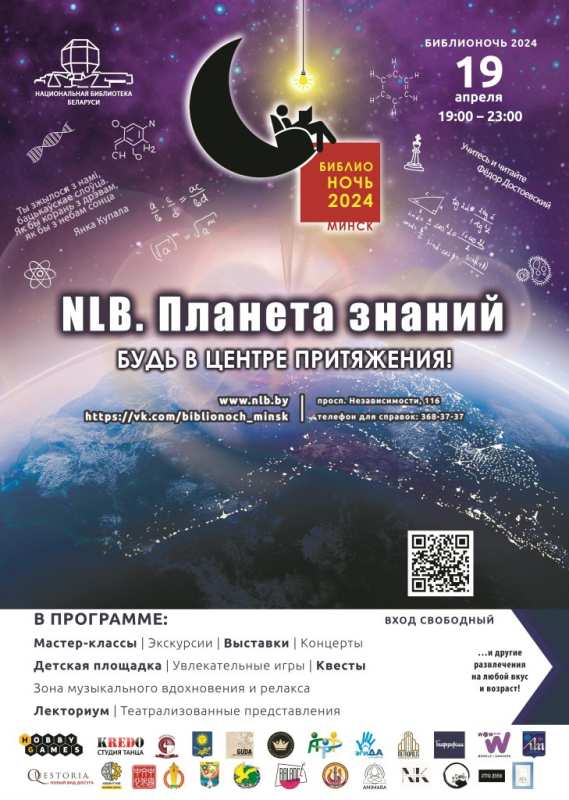November 26 marks the 90th anniversary of Uladzimir Karatkievich (1930–1984), one of the brightest, most original and, perhaps, the most widely read representative of the Belarusian literature of the second half of the 20th century.
In less than 54 years of his life, he managed to brilliantly declare himself in poetry and fiction, journalism and criticism, children's literature and translations, drama for theatre, opera and cinema.
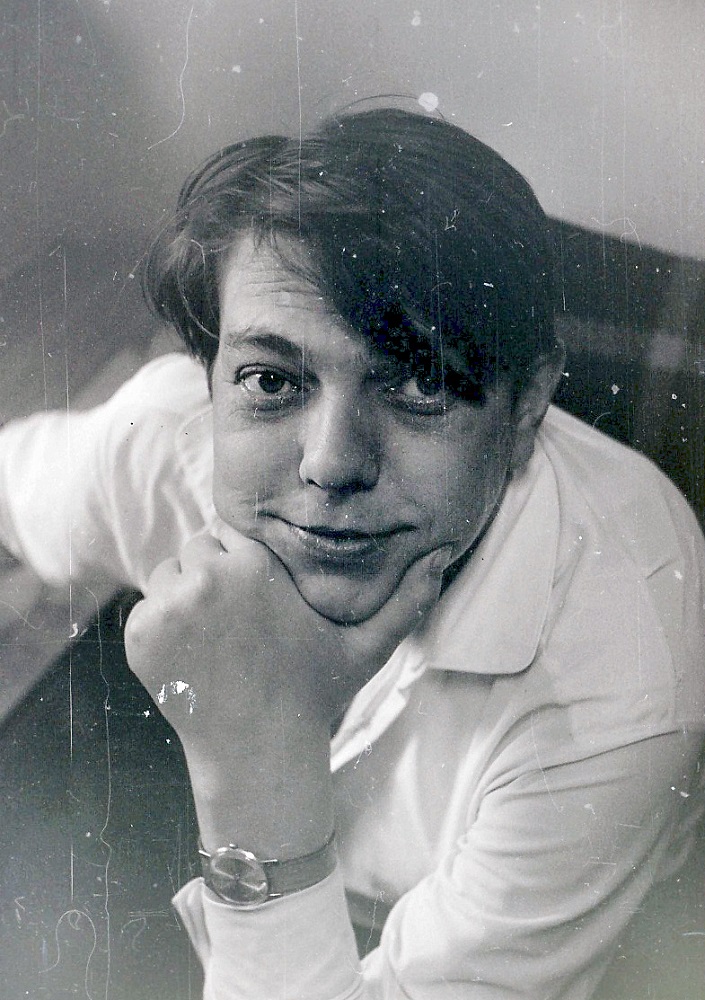
Fate gave him a short but eventful life. U. Karatkievich was born in Orsha. A warm family environment encouraged future writer's growth in many ways. His father, Siamion, worked as a budget inspector in the Orsha district finance department. His mother, Nadzezhda, was a graduate of the Mariinskaya Gymnasium. She worked as a teacher in a rural school near Ragachow for some time and had a great command of the world literature.
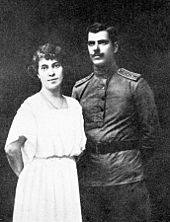
Parents of U. Karatkievich. 1915.
But the biggest influence on the future writer was his maternal grandfather, Vasiliy Grynkevich, who was a provincial treasurer. Thanks to him – a man of boundless energy and passion, who possessed great physical and spiritual power, and knew many Belarusian folk fairy-tales and legends – Uladzimir Karatkievich fell in love with Belarusian history and nature, and his grandfather's stories became the source of plots for many of his works.
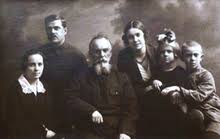
In the centre is Karatkievich's grandfather. 1928.
As a child, U. Karatkievich showed talent in various fields: he drew well, participated in theatrical productions, played musical instruments. Like hundreds of thousands of peers, he had to endure the horrors of war: the massive bombing of Orsha, unsuccessful evacuation attempt, hard guerrilla life, a dormitory in the Urals, unsuccessful escapes to the front.
In the post-war years, he – a schoolboy from Orsha – published several of his poems on the pages of the school handwritten magazine "Zvanochak". Love for literature led the young man to the University of Kyiv to the Faculty of Philology. The student years (1949–1954) became a time of the artistic search for U. Karatkievich. After graduating from the university, he worked as a teacher in a rural school near Kyiv, and then in Orsha from 1956 to 1958.
The first two poems by Karatkievich were published in 1951 in the Orsha district newspaper "Leninski Pryzyw" (No. 90, p. 3) – the first in Belarusian was called "To Jakub Kolas" and the second in Russian "A channel will Be Here". In July 1955, a poem "Masheka" dedicated to the hero of Belarusian legends was published in the "Polymia" journal. According to the writer, this event was a turning point. He finally turned his attention to literary art, in which a significant part was taken by the pieces on historical themes. In the autumn of 1955, Karatkievich took part in a national meeting of young writers in Minsk, where his poems were highly appreciated. The first collection of poems "Mother's Soul", published in 1958, testified that the original talent came to literature with his own plots, images, vision of the world.
In 1958–1962, Karatkievich continued his education in Moscow: first at the Higher Literary Courses, and then at the Institute of Cinematography on script courses. The Moscow period of life was fruitful for the writer. Here he wrote his second book of poems, "Evening Winds" (1960). Poetic skills always accompanied U. Karatkievich's talent, lived in him even when he wrote prose. Unpublished poems made up the posthumous collection “I Was. I am. I Will Be" (1986). This poetic testament to the next generation, created by the hand of a master, is full of wise life conclusions.
Karatkievich's prose received wide recognition both in Belarus and far beyond its borders. As a mature writer with a pronounced lyrical and romantic talent, he showed himself in the first collection of prose "The Blue and Gold of the Day" (1961). Historical plots of "The Gypsy King" and "The Grey Legend", which became the basis of libretto for the opera by D. Smolski, showed that Uladzimir Karatkievich not only knew the past of his people but also knew how to recreate it in vivid artistic images. Back in Moscow, the idea of the first novel "One Needs to Remember" ("The Leonids Will Not Return to the Earth") was conceived. It was published in "Polymia" (1962). The novel had expressive features of socio-philosophical, intellectual and socio-psychological prose.
A special place in the oeuvre of Karatkievich is taken by the tragic events of the 1863 uprising and the personality of Kastus Kalinowski. He became the hero of several major writer's works: the historical novel "Spikes Under your Sickle" (1965), the tragedy "Kastus Kalinowski" (1963), and others. The writer's undoubted success was also a deep and meaningful philosophical and historical novel “Christ Landed in Harodnia” (1966; eponymous movie, 1967). U. Karatkievich addresses the history of our country in the novels "The Vessel of Sorrows", "The Grey Legend", "The Gypsy King", plays "Vitebsk Bells", "The Mother of Hurricane", etc.
Special affinities for the genre of historical detective. The evidence of Karatkievich's artistic search was such historical and adventure pieces as the story "King Stakh’s Wild Hunt" (1964; eponymous movie, 1979) and the novel "The Black Castle of Alshany" (1979-1980; eponymous movie 1984). Created according to the rules of romance and adventure literature, they became a discovery in modern Belarusian literature, and Karatkievich is rightfully considered the founder of the historical detective genre.
Uladzimir Karatkievich not only studied the history of the Belarusian people but also actively learned their modern life, tried to see lots of new places, often visited Belarusian towns and villages. Almost every trip became the basis of a literary work. Reading U. Karatkievich's notebooks "On the Road and at Home" (published in the first three issues of "Polymia", 1989) makes it possible to better understand why "Fairy-Tales of the Amber Land", "Gypsy Country", "Mstsislaw", "The Land Under White Wings” (1977) came to life and became brands of Belarus.
U. Karatkievich showed his talent in journalism, literary criticism and literary translations, which became part of his self-expression. Back in the 1950s, he translated into Belarusian some works of Catullus, G. Byron, A. Mitskevich, M. Karim, R. Gamzatov and others. In turn, the most popular writings of Karatkievich have also been translated into many languages of the world.
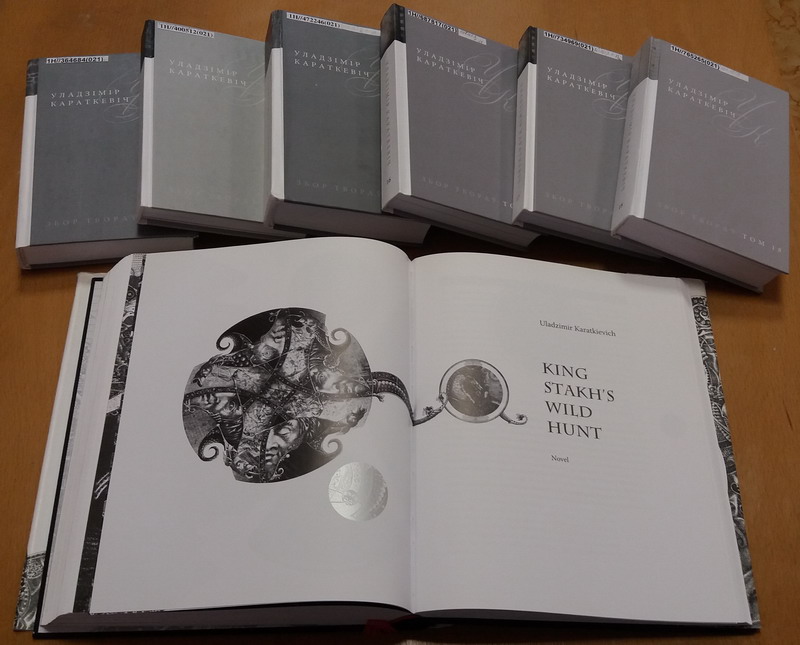
The latest publications of U. Karatkievich
The rich graphic heritage of the master of word expression also fascinates: his drawings, including illustrations to his own works, types of ancient castles and sketches of historical characters, as well as caricatures and friendly cartoons, satirical and humorous drawings. Some of them have been included in the book "The World through the Eyes of Karatkievich" (2006). The eighteenth volume of the 25-volume “Collected Works of Uladzimir Karatkievich” ("Mastatskaja Litaratura" publishing house) is dedicated to them. This is the most complete collection with scientific commentaries, which will include not only famous works of the writer but also texts that were never published during Karatkievich's life. Three volumes are devoted to scripts for feature films and documentaries written by Karatkievich. Two volumes are reserved for the writer's correspondence with Uladzimir Kalesnik, Vasil Bykaw, Maksim Tank. Two volumes are designated for journalistic writings. A significant part in the collection is given to Karatkievich's diaries, excerpts from notebooks. CDs with the songs by Uladzimir Karatkievich performed by himself, performances on radio, television, in the Writers' Union, as well as an electronic library will supplement the books. It should be noted that you can come across unexpected findings associated with the name of Karatkievich to this day...
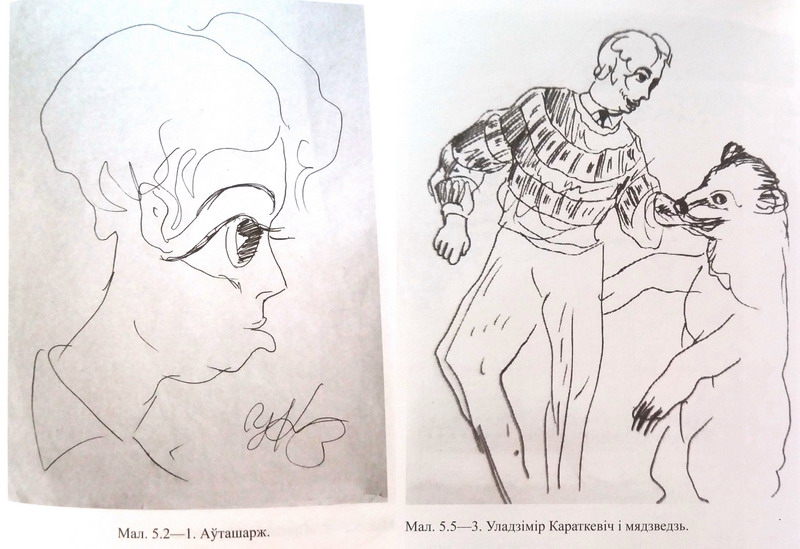
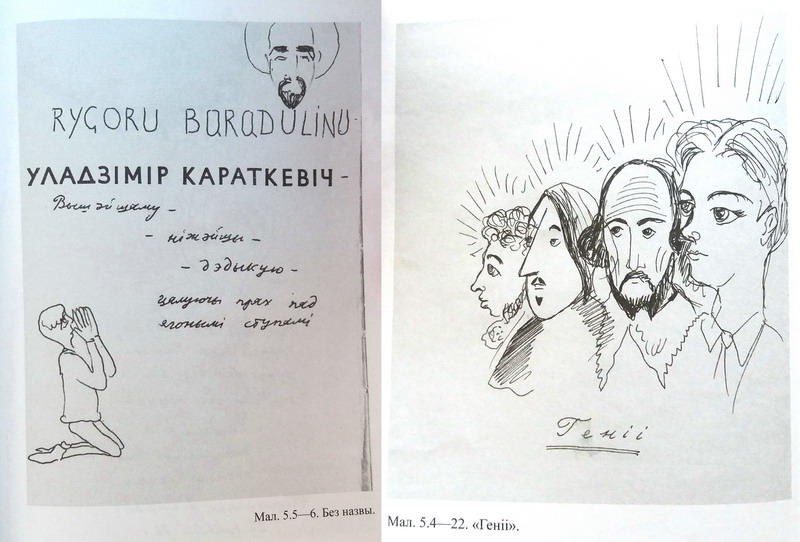
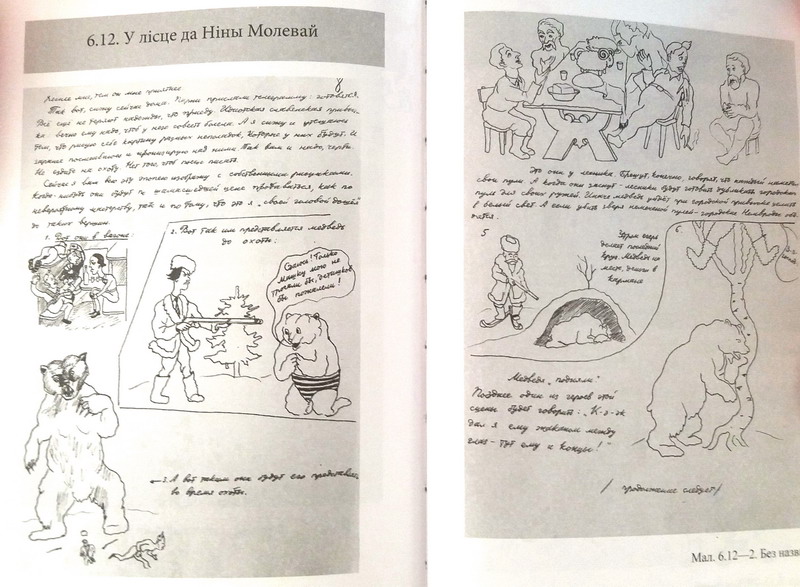
The plays by Uladzimir Karatkievich have been staged in many Belarusian theatres. Two operas based on his literary pieces have been staged at the National Academic Opera and Ballet Theatre: "The Grey Legend" by D. Smolski and "King Stakh’s Wild Hunt" by U. Soltan. The latter became a real sensation in the theatrical life of the country and has been on the stage of the Belarusian Bolshoi Theatre for more than twenty years. Spectators and listeners, spellbound, plunge into the world of images of a historical detective and into the music of the wild hunt itself, one of the most powerful and striking themes of the opera.
Feature films based on the pieces by Uladzimir Karatkievich were also shot, television and radio programs were created, including a documentary film “I Was. I Am. I Will Be”, several videos. A number of monographs have been published on the writer's work.
A museum has been created in Orsha, the homeland of Karatkievich.
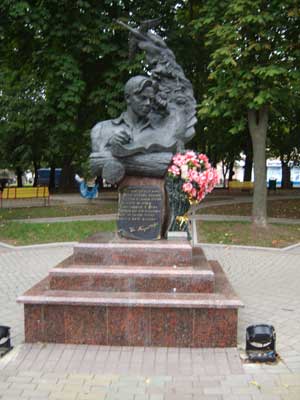
Monument to U. Karatkievich in Orsha. Sculptor I. Golubew
In 1980, U. Karatkievich was awarded the Order of Peoples' Friendship. He was a laureate of the I. Melezh award (1983; for the novel “One Needs to Remember”) and the State Prize of Belarus named after Jakub Kolas (1984; for the novel “The Black Castle of Alshany”). The Foundation for Assistance to Young Writers and the Prize of the "Mastatskaja Litaratura" publishing house are named after him. Sculptural monuments to U. Karatkievich have been installed in Orsha, Vitsebsk and Kyiv in front of the building of the Embassy of the Republic of Belarus in Ukraine.
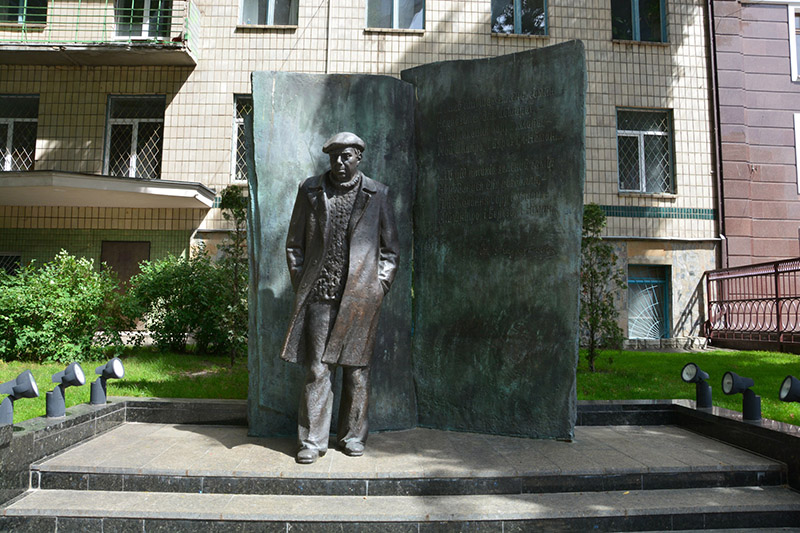
A monument to U. Karatkievich in Kyiv. Authors: Belarusian sculptors K. Selikhanaw and O. Varvashenia, architect A. Korbut
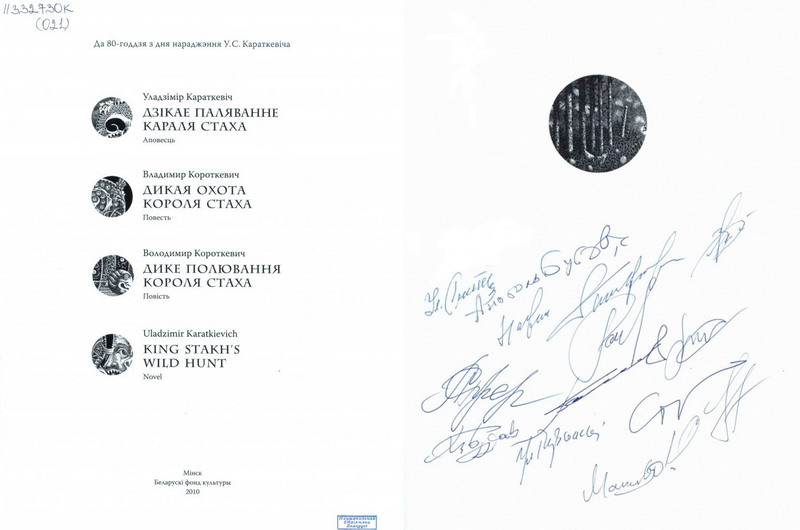
In 2010, the story “King Stakh’s Wild Hunt” was published in four languages: Belarusian, Russian, Ukrainian and English, a joint project of the Ministry of Culture of the Republic of Belarus and the Belarusian Cultural Foundation, timed to coincide with the 80th birthday of U. Karatkievich. In the preface to the publication, Anatoli Butevich wrote:
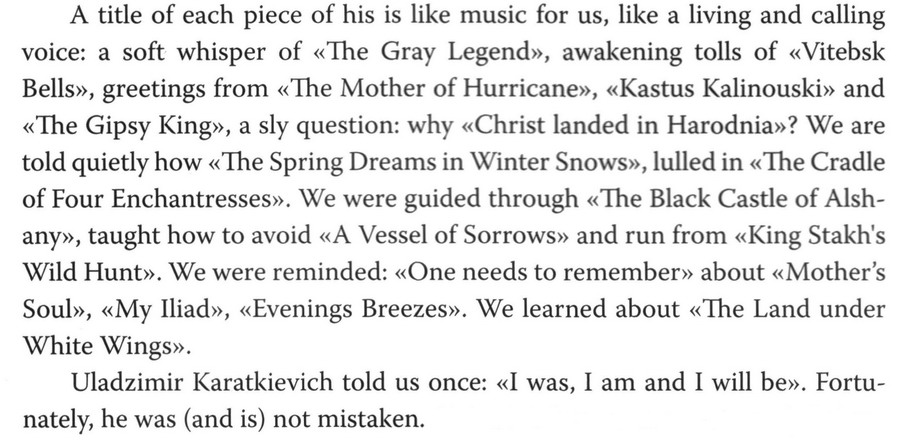
It is simply impossible to imagine Belarus today without Karatkievich, who was infinitely in love with his motherland.
Let's take an advantage of the anniversary date once again and go on a fascinating journey in the world of mysteries and mysterious images, historical events and mysticism together with the great master of the word Uladzimir Karatkievich. His writings, literature about him, recordings, visual materials, as well as scientific dissertations can be found in the E-Catalogue of the National Library of Belarus; biographical materials – in the online encyclopaedia "Belarus in Persons and Events" (in Belarusian). You can discover Karatkievich the Artist by visiting an exhibition at the National Library of Belarus "The Principality of Images and Words" organized jointly with the Belarusian Union of Artists. An interesting exhibition "From the Books of Uladzimir Karatkievich" is also presented in the library's Book Museum.
If on the birthday of Karatkievich one misses the opportunity to immerse in reading one of his books, the audience can travel through the labyrinths of creativity, love, temptations, unexpected mysteries related to the personality of Karatkievich with the actors of the Republican Theatre of Belarusian Drama, as well as the ensemble "Music Arch". The broadcast of the festive performance "Our Karatkievich" (in Belarusian) will also be available for free anywhere in Belarus and the world.
Bibliology Research Department.

